Entrepreneurship & Small Business: Ventures, Traits and Impact
VerifiedAdded on 2023/01/11
|20
|6179
|77
Report
AI Summary
This report provides a comprehensive overview of entrepreneurship and small business management, covering various aspects such as different types of entrepreneurial ventures (survival, lifestyle, growth), typologies (scalable, social, large/small company), and their similarities and differences. It analyzes the impact of micro and small businesses on the economy at local, regional, national, and international levels, supported by relevant data and statistics. Furthermore, the report identifies the characteristic traits and skills of successful entrepreneurs, differentiating them from other business managers, and assesses how entrepreneurial personality reflects motivation and mindset. Finally, it discusses how personal background and experience can either hinder or foster entrepreneurship, influencing an entrepreneur's leadership and decision-making.

Entrepreneurship and
Small Business
Management
Small Business
Management
Paraphrase This Document
Need a fresh take? Get an instant paraphrase of this document with our AI Paraphraser
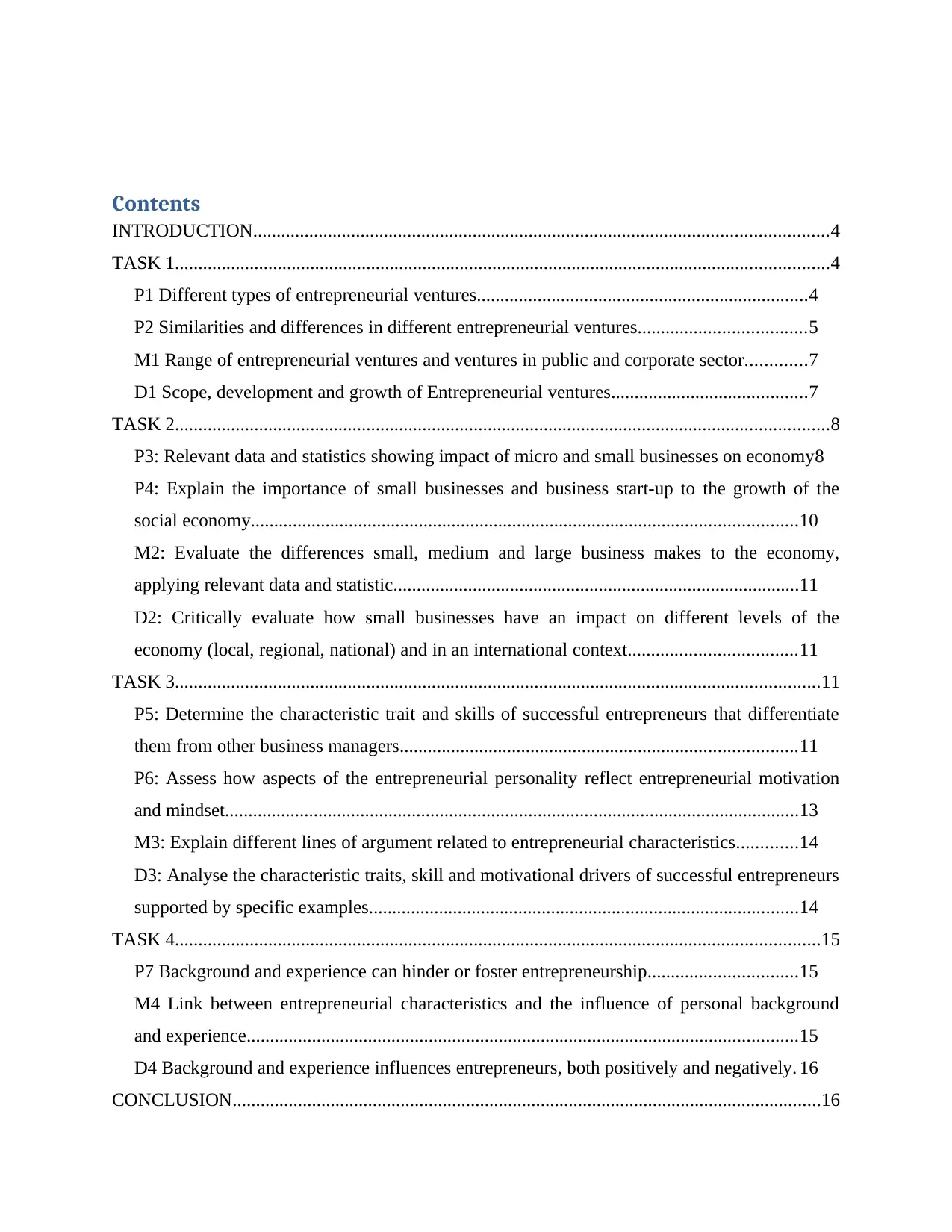
Contents
INTRODUCTION...........................................................................................................................4
TASK 1............................................................................................................................................4
P1 Different types of entrepreneurial ventures.......................................................................4
P2 Similarities and differences in different entrepreneurial ventures....................................5
M1 Range of entrepreneurial ventures and ventures in public and corporate sector.............7
D1 Scope, development and growth of Entrepreneurial ventures..........................................7
TASK 2............................................................................................................................................8
P3: Relevant data and statistics showing impact of micro and small businesses on economy8
P4: Explain the importance of small businesses and business start-up to the growth of the
social economy.....................................................................................................................10
M2: Evaluate the differences small, medium and large business makes to the economy,
applying relevant data and statistic.......................................................................................11
D2: Critically evaluate how small businesses have an impact on different levels of the
economy (local, regional, national) and in an international context....................................11
TASK 3..........................................................................................................................................11
P5: Determine the characteristic trait and skills of successful entrepreneurs that differentiate
them from other business managers.....................................................................................11
P6: Assess how aspects of the entrepreneurial personality reflect entrepreneurial motivation
and mindset...........................................................................................................................13
M3: Explain different lines of argument related to entrepreneurial characteristics.............14
D3: Analyse the characteristic traits, skill and motivational drivers of successful entrepreneurs
supported by specific examples............................................................................................14
TASK 4..........................................................................................................................................15
P7 Background and experience can hinder or foster entrepreneurship................................15
M4 Link between entrepreneurial characteristics and the influence of personal background
and experience......................................................................................................................15
D4 Background and experience influences entrepreneurs, both positively and negatively. 16
CONCLUSION..............................................................................................................................16
INTRODUCTION...........................................................................................................................4
TASK 1............................................................................................................................................4
P1 Different types of entrepreneurial ventures.......................................................................4
P2 Similarities and differences in different entrepreneurial ventures....................................5
M1 Range of entrepreneurial ventures and ventures in public and corporate sector.............7
D1 Scope, development and growth of Entrepreneurial ventures..........................................7
TASK 2............................................................................................................................................8
P3: Relevant data and statistics showing impact of micro and small businesses on economy8
P4: Explain the importance of small businesses and business start-up to the growth of the
social economy.....................................................................................................................10
M2: Evaluate the differences small, medium and large business makes to the economy,
applying relevant data and statistic.......................................................................................11
D2: Critically evaluate how small businesses have an impact on different levels of the
economy (local, regional, national) and in an international context....................................11
TASK 3..........................................................................................................................................11
P5: Determine the characteristic trait and skills of successful entrepreneurs that differentiate
them from other business managers.....................................................................................11
P6: Assess how aspects of the entrepreneurial personality reflect entrepreneurial motivation
and mindset...........................................................................................................................13
M3: Explain different lines of argument related to entrepreneurial characteristics.............14
D3: Analyse the characteristic traits, skill and motivational drivers of successful entrepreneurs
supported by specific examples............................................................................................14
TASK 4..........................................................................................................................................15
P7 Background and experience can hinder or foster entrepreneurship................................15
M4 Link between entrepreneurial characteristics and the influence of personal background
and experience......................................................................................................................15
D4 Background and experience influences entrepreneurs, both positively and negatively. 16
CONCLUSION..............................................................................................................................16

REFERENCES..............................................................................................................................18
⊘ This is a preview!⊘
Do you want full access?
Subscribe today to unlock all pages.

Trusted by 1+ million students worldwide
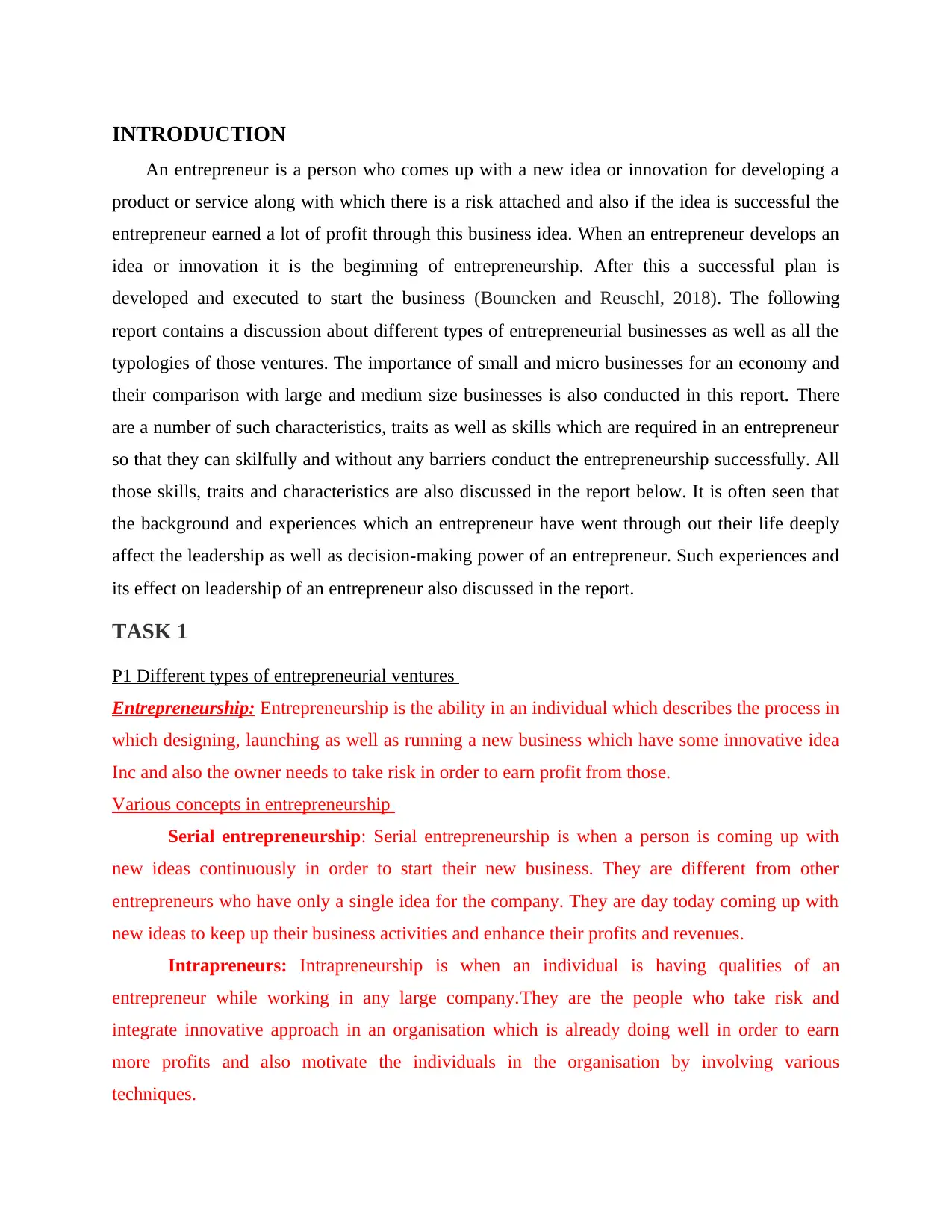
INTRODUCTION
An entrepreneur is a person who comes up with a new idea or innovation for developing a
product or service along with which there is a risk attached and also if the idea is successful the
entrepreneur earned a lot of profit through this business idea. When an entrepreneur develops an
idea or innovation it is the beginning of entrepreneurship. After this a successful plan is
developed and executed to start the business (Bouncken and Reuschl, 2018). The following
report contains a discussion about different types of entrepreneurial businesses as well as all the
typologies of those ventures. The importance of small and micro businesses for an economy and
their comparison with large and medium size businesses is also conducted in this report. There
are a number of such characteristics, traits as well as skills which are required in an entrepreneur
so that they can skilfully and without any barriers conduct the entrepreneurship successfully. All
those skills, traits and characteristics are also discussed in the report below. It is often seen that
the background and experiences which an entrepreneur have went through out their life deeply
affect the leadership as well as decision-making power of an entrepreneur. Such experiences and
its effect on leadership of an entrepreneur also discussed in the report.
TASK 1
P1 Different types of entrepreneurial ventures
Entrepreneurship: Entrepreneurship is the ability in an individual which describes the process in
which designing, launching as well as running a new business which have some innovative idea
Inc and also the owner needs to take risk in order to earn profit from those.
Various concepts in entrepreneurship
Serial entrepreneurship: Serial entrepreneurship is when a person is coming up with
new ideas continuously in order to start their new business. They are different from other
entrepreneurs who have only a single idea for the company. They are day today coming up with
new ideas to keep up their business activities and enhance their profits and revenues.
Intrapreneurs: Intrapreneurship is when an individual is having qualities of an
entrepreneur while working in any large company.They are the people who take risk and
integrate innovative approach in an organisation which is already doing well in order to earn
more profits and also motivate the individuals in the organisation by involving various
techniques.
An entrepreneur is a person who comes up with a new idea or innovation for developing a
product or service along with which there is a risk attached and also if the idea is successful the
entrepreneur earned a lot of profit through this business idea. When an entrepreneur develops an
idea or innovation it is the beginning of entrepreneurship. After this a successful plan is
developed and executed to start the business (Bouncken and Reuschl, 2018). The following
report contains a discussion about different types of entrepreneurial businesses as well as all the
typologies of those ventures. The importance of small and micro businesses for an economy and
their comparison with large and medium size businesses is also conducted in this report. There
are a number of such characteristics, traits as well as skills which are required in an entrepreneur
so that they can skilfully and without any barriers conduct the entrepreneurship successfully. All
those skills, traits and characteristics are also discussed in the report below. It is often seen that
the background and experiences which an entrepreneur have went through out their life deeply
affect the leadership as well as decision-making power of an entrepreneur. Such experiences and
its effect on leadership of an entrepreneur also discussed in the report.
TASK 1
P1 Different types of entrepreneurial ventures
Entrepreneurship: Entrepreneurship is the ability in an individual which describes the process in
which designing, launching as well as running a new business which have some innovative idea
Inc and also the owner needs to take risk in order to earn profit from those.
Various concepts in entrepreneurship
Serial entrepreneurship: Serial entrepreneurship is when a person is coming up with
new ideas continuously in order to start their new business. They are different from other
entrepreneurs who have only a single idea for the company. They are day today coming up with
new ideas to keep up their business activities and enhance their profits and revenues.
Intrapreneurs: Intrapreneurship is when an individual is having qualities of an
entrepreneur while working in any large company.They are the people who take risk and
integrate innovative approach in an organisation which is already doing well in order to earn
more profits and also motivate the individuals in the organisation by involving various
techniques.
Paraphrase This Document
Need a fresh take? Get an instant paraphrase of this document with our AI Paraphraser
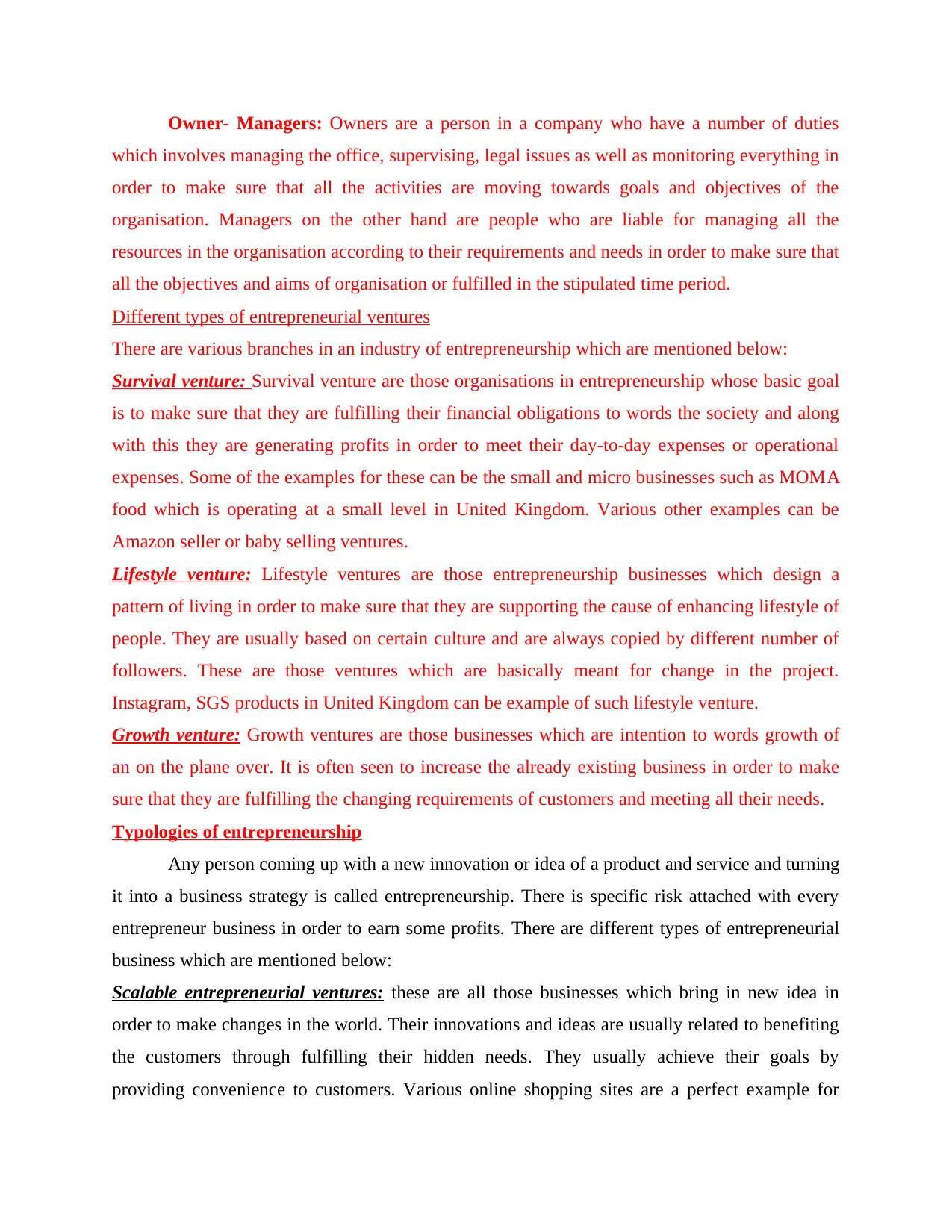
Owner- Managers: Owners are a person in a company who have a number of duties
which involves managing the office, supervising, legal issues as well as monitoring everything in
order to make sure that all the activities are moving towards goals and objectives of the
organisation. Managers on the other hand are people who are liable for managing all the
resources in the organisation according to their requirements and needs in order to make sure that
all the objectives and aims of organisation or fulfilled in the stipulated time period.
Different types of entrepreneurial ventures
There are various branches in an industry of entrepreneurship which are mentioned below:
Survival venture: Survival venture are those organisations in entrepreneurship whose basic goal
is to make sure that they are fulfilling their financial obligations to words the society and along
with this they are generating profits in order to meet their day-to-day expenses or operational
expenses. Some of the examples for these can be the small and micro businesses such as MOMA
food which is operating at a small level in United Kingdom. Various other examples can be
Amazon seller or baby selling ventures.
Lifestyle venture: Lifestyle ventures are those entrepreneurship businesses which design a
pattern of living in order to make sure that they are supporting the cause of enhancing lifestyle of
people. They are usually based on certain culture and are always copied by different number of
followers. These are those ventures which are basically meant for change in the project.
Instagram, SGS products in United Kingdom can be example of such lifestyle venture.
Growth venture: Growth ventures are those businesses which are intention to words growth of
an on the plane over. It is often seen to increase the already existing business in order to make
sure that they are fulfilling the changing requirements of customers and meeting all their needs.
Typologies of entrepreneurship
Any person coming up with a new innovation or idea of a product and service and turning
it into a business strategy is called entrepreneurship. There is specific risk attached with every
entrepreneur business in order to earn some profits. There are different types of entrepreneurial
business which are mentioned below:
Scalable entrepreneurial ventures: these are all those businesses which bring in new idea in
order to make changes in the world. Their innovations and ideas are usually related to benefiting
the customers through fulfilling their hidden needs. They usually achieve their goals by
providing convenience to customers. Various online shopping sites are a perfect example for
which involves managing the office, supervising, legal issues as well as monitoring everything in
order to make sure that all the activities are moving towards goals and objectives of the
organisation. Managers on the other hand are people who are liable for managing all the
resources in the organisation according to their requirements and needs in order to make sure that
all the objectives and aims of organisation or fulfilled in the stipulated time period.
Different types of entrepreneurial ventures
There are various branches in an industry of entrepreneurship which are mentioned below:
Survival venture: Survival venture are those organisations in entrepreneurship whose basic goal
is to make sure that they are fulfilling their financial obligations to words the society and along
with this they are generating profits in order to meet their day-to-day expenses or operational
expenses. Some of the examples for these can be the small and micro businesses such as MOMA
food which is operating at a small level in United Kingdom. Various other examples can be
Amazon seller or baby selling ventures.
Lifestyle venture: Lifestyle ventures are those entrepreneurship businesses which design a
pattern of living in order to make sure that they are supporting the cause of enhancing lifestyle of
people. They are usually based on certain culture and are always copied by different number of
followers. These are those ventures which are basically meant for change in the project.
Instagram, SGS products in United Kingdom can be example of such lifestyle venture.
Growth venture: Growth ventures are those businesses which are intention to words growth of
an on the plane over. It is often seen to increase the already existing business in order to make
sure that they are fulfilling the changing requirements of customers and meeting all their needs.
Typologies of entrepreneurship
Any person coming up with a new innovation or idea of a product and service and turning
it into a business strategy is called entrepreneurship. There is specific risk attached with every
entrepreneur business in order to earn some profits. There are different types of entrepreneurial
business which are mentioned below:
Scalable entrepreneurial ventures: these are all those businesses which bring in new idea in
order to make changes in the world. Their innovations and ideas are usually related to benefiting
the customers through fulfilling their hidden needs. They usually achieve their goals by
providing convenience to customers. Various online shopping sites are a perfect example for
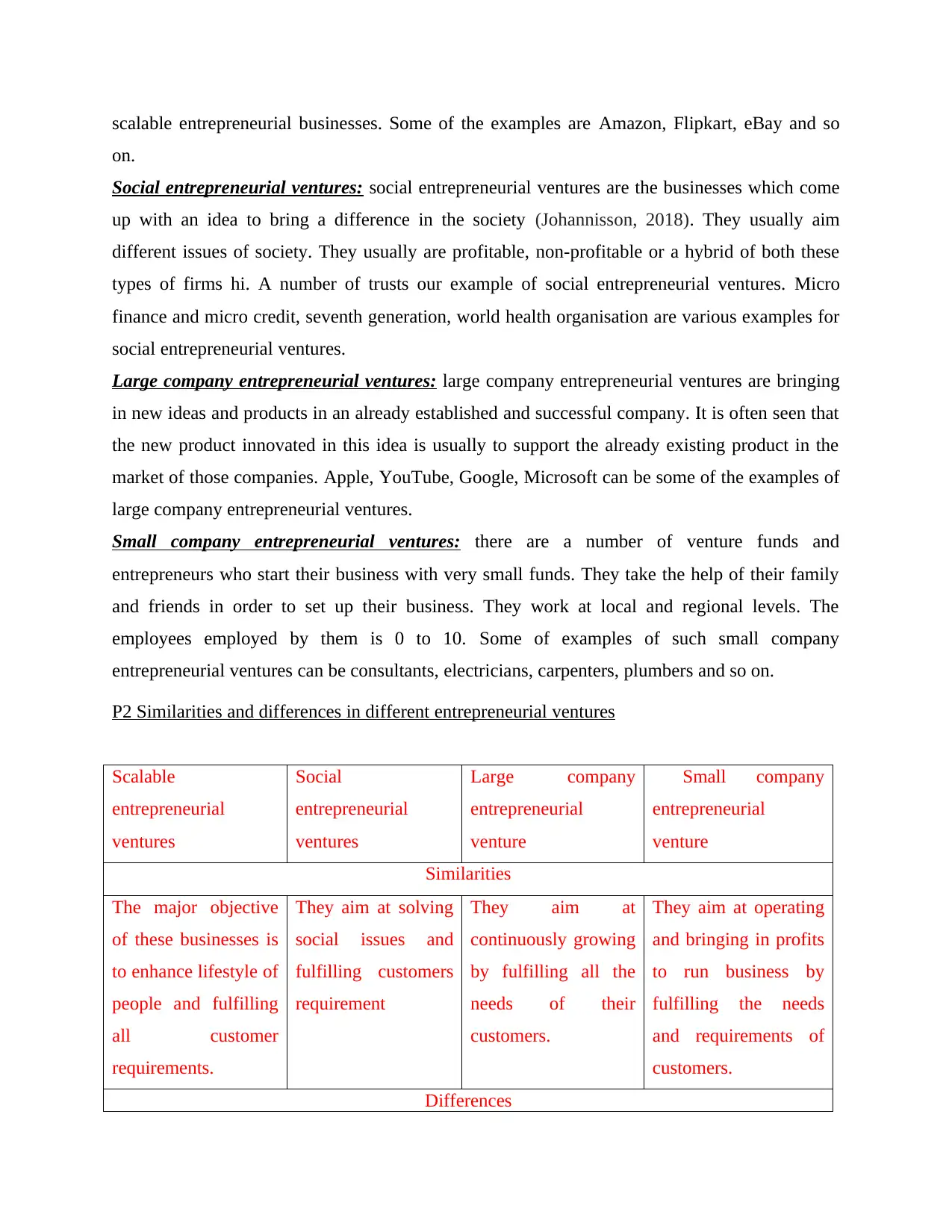
scalable entrepreneurial businesses. Some of the examples are Amazon, Flipkart, eBay and so
on.
Social entrepreneurial ventures: social entrepreneurial ventures are the businesses which come
up with an idea to bring a difference in the society (Johannisson, 2018). They usually aim
different issues of society. They usually are profitable, non-profitable or a hybrid of both these
types of firms hi. A number of trusts our example of social entrepreneurial ventures. Micro
finance and micro credit, seventh generation, world health organisation are various examples for
social entrepreneurial ventures.
Large company entrepreneurial ventures: large company entrepreneurial ventures are bringing
in new ideas and products in an already established and successful company. It is often seen that
the new product innovated in this idea is usually to support the already existing product in the
market of those companies. Apple, YouTube, Google, Microsoft can be some of the examples of
large company entrepreneurial ventures.
Small company entrepreneurial ventures: there are a number of venture funds and
entrepreneurs who start their business with very small funds. They take the help of their family
and friends in order to set up their business. They work at local and regional levels. The
employees employed by them is 0 to 10. Some of examples of such small company
entrepreneurial ventures can be consultants, electricians, carpenters, plumbers and so on.
P2 Similarities and differences in different entrepreneurial ventures
Scalable
entrepreneurial
ventures
Social
entrepreneurial
ventures
Large company
entrepreneurial
venture
Small company
entrepreneurial
venture
Similarities
The major objective
of these businesses is
to enhance lifestyle of
people and fulfilling
all customer
requirements.
They aim at solving
social issues and
fulfilling customers
requirement
They aim at
continuously growing
by fulfilling all the
needs of their
customers.
They aim at operating
and bringing in profits
to run business by
fulfilling the needs
and requirements of
customers.
Differences
on.
Social entrepreneurial ventures: social entrepreneurial ventures are the businesses which come
up with an idea to bring a difference in the society (Johannisson, 2018). They usually aim
different issues of society. They usually are profitable, non-profitable or a hybrid of both these
types of firms hi. A number of trusts our example of social entrepreneurial ventures. Micro
finance and micro credit, seventh generation, world health organisation are various examples for
social entrepreneurial ventures.
Large company entrepreneurial ventures: large company entrepreneurial ventures are bringing
in new ideas and products in an already established and successful company. It is often seen that
the new product innovated in this idea is usually to support the already existing product in the
market of those companies. Apple, YouTube, Google, Microsoft can be some of the examples of
large company entrepreneurial ventures.
Small company entrepreneurial ventures: there are a number of venture funds and
entrepreneurs who start their business with very small funds. They take the help of their family
and friends in order to set up their business. They work at local and regional levels. The
employees employed by them is 0 to 10. Some of examples of such small company
entrepreneurial ventures can be consultants, electricians, carpenters, plumbers and so on.
P2 Similarities and differences in different entrepreneurial ventures
Scalable
entrepreneurial
ventures
Social
entrepreneurial
ventures
Large company
entrepreneurial
venture
Small company
entrepreneurial
venture
Similarities
The major objective
of these businesses is
to enhance lifestyle of
people and fulfilling
all customer
requirements.
They aim at solving
social issues and
fulfilling customers
requirement
They aim at
continuously growing
by fulfilling all the
needs of their
customers.
They aim at operating
and bringing in profits
to run business by
fulfilling the needs
and requirements of
customers.
Differences
⊘ This is a preview!⊘
Do you want full access?
Subscribe today to unlock all pages.

Trusted by 1+ million students worldwide
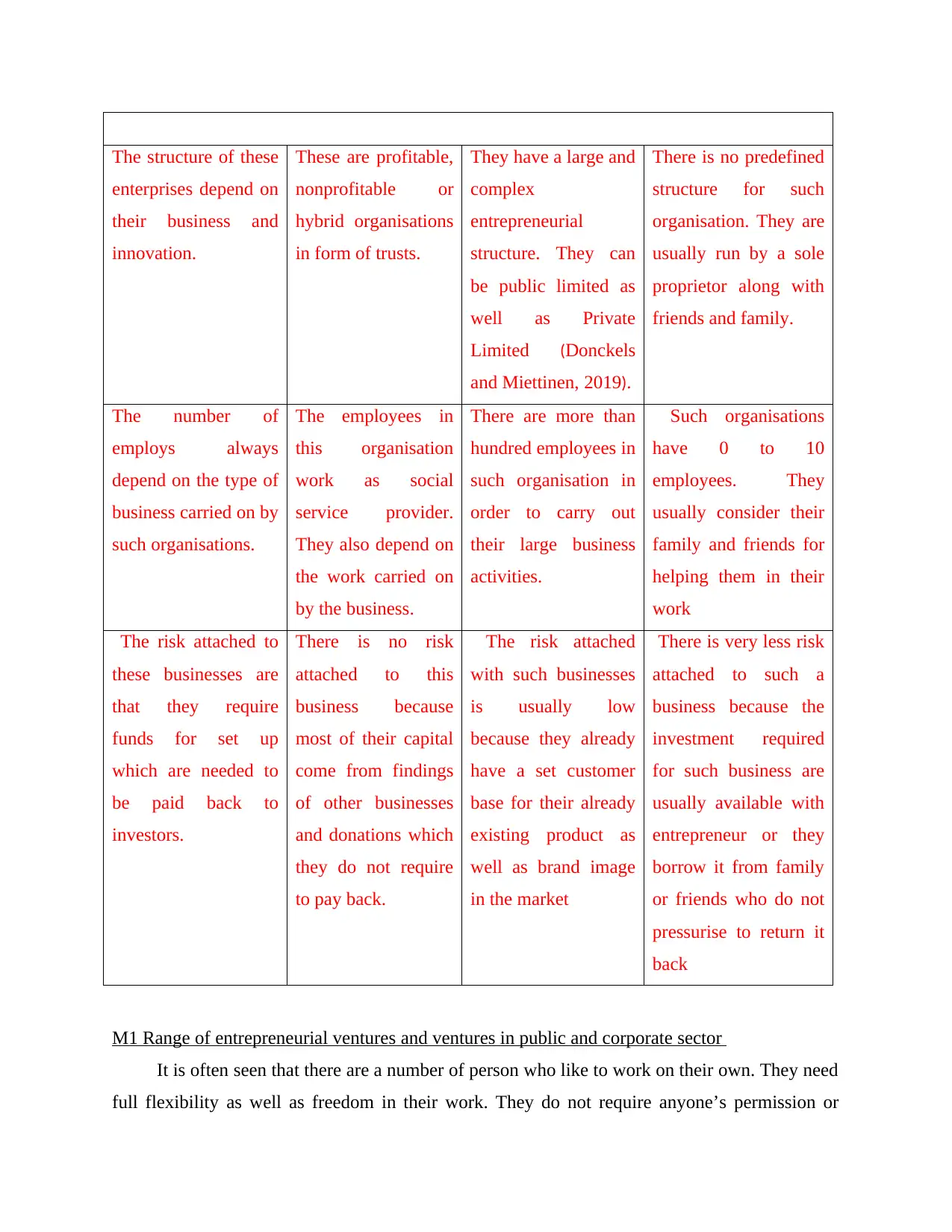
The structure of these
enterprises depend on
their business and
innovation.
These are profitable,
nonprofitable or
hybrid organisations
in form of trusts.
They have a large and
complex
entrepreneurial
structure. They can
be public limited as
well as Private
Limited (Donckels
and Miettinen, 2019).
There is no predefined
structure for such
organisation. They are
usually run by a sole
proprietor along with
friends and family.
The number of
employs always
depend on the type of
business carried on by
such organisations.
The employees in
this organisation
work as social
service provider.
They also depend on
the work carried on
by the business.
There are more than
hundred employees in
such organisation in
order to carry out
their large business
activities.
Such organisations
have 0 to 10
employees. They
usually consider their
family and friends for
helping them in their
work
The risk attached to
these businesses are
that they require
funds for set up
which are needed to
be paid back to
investors.
There is no risk
attached to this
business because
most of their capital
come from findings
of other businesses
and donations which
they do not require
to pay back.
The risk attached
with such businesses
is usually low
because they already
have a set customer
base for their already
existing product as
well as brand image
in the market
There is very less risk
attached to such a
business because the
investment required
for such business are
usually available with
entrepreneur or they
borrow it from family
or friends who do not
pressurise to return it
back
M1 Range of entrepreneurial ventures and ventures in public and corporate sector
It is often seen that there are a number of person who like to work on their own. They need
full flexibility as well as freedom in their work. They do not require anyone’s permission or
enterprises depend on
their business and
innovation.
These are profitable,
nonprofitable or
hybrid organisations
in form of trusts.
They have a large and
complex
entrepreneurial
structure. They can
be public limited as
well as Private
Limited (Donckels
and Miettinen, 2019).
There is no predefined
structure for such
organisation. They are
usually run by a sole
proprietor along with
friends and family.
The number of
employs always
depend on the type of
business carried on by
such organisations.
The employees in
this organisation
work as social
service provider.
They also depend on
the work carried on
by the business.
There are more than
hundred employees in
such organisation in
order to carry out
their large business
activities.
Such organisations
have 0 to 10
employees. They
usually consider their
family and friends for
helping them in their
work
The risk attached to
these businesses are
that they require
funds for set up
which are needed to
be paid back to
investors.
There is no risk
attached to this
business because
most of their capital
come from findings
of other businesses
and donations which
they do not require
to pay back.
The risk attached
with such businesses
is usually low
because they already
have a set customer
base for their already
existing product as
well as brand image
in the market
There is very less risk
attached to such a
business because the
investment required
for such business are
usually available with
entrepreneur or they
borrow it from family
or friends who do not
pressurise to return it
back
M1 Range of entrepreneurial ventures and ventures in public and corporate sector
It is often seen that there are a number of person who like to work on their own. They need
full flexibility as well as freedom in their work. They do not require anyone’s permission or
Paraphrase This Document
Need a fresh take? Get an instant paraphrase of this document with our AI Paraphraser
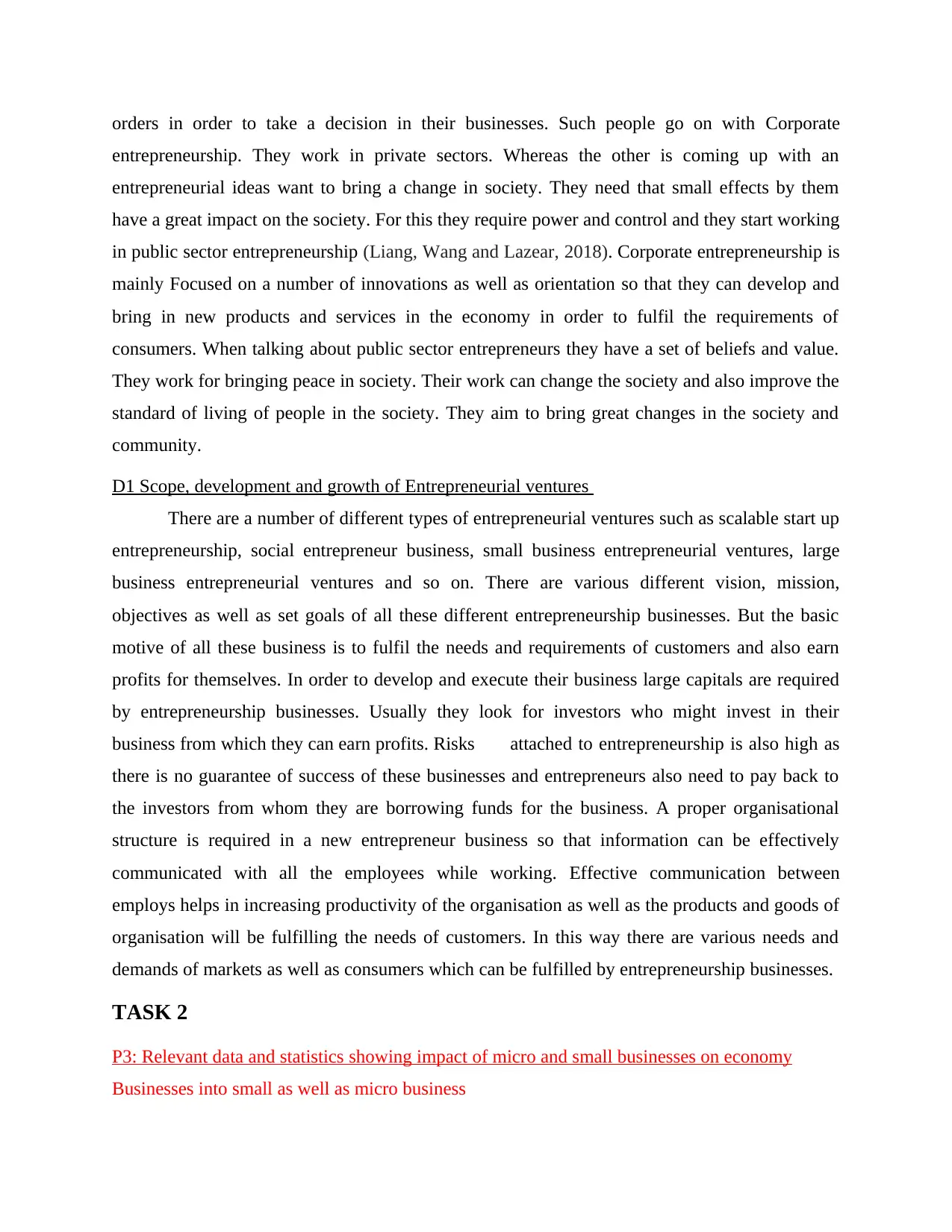
orders in order to take a decision in their businesses. Such people go on with Corporate
entrepreneurship. They work in private sectors. Whereas the other is coming up with an
entrepreneurial ideas want to bring a change in society. They need that small effects by them
have a great impact on the society. For this they require power and control and they start working
in public sector entrepreneurship (Liang, Wang and Lazear, 2018). Corporate entrepreneurship is
mainly Focused on a number of innovations as well as orientation so that they can develop and
bring in new products and services in the economy in order to fulfil the requirements of
consumers. When talking about public sector entrepreneurs they have a set of beliefs and value.
They work for bringing peace in society. Their work can change the society and also improve the
standard of living of people in the society. They aim to bring great changes in the society and
community.
D1 Scope, development and growth of Entrepreneurial ventures
There are a number of different types of entrepreneurial ventures such as scalable start up
entrepreneurship, social entrepreneur business, small business entrepreneurial ventures, large
business entrepreneurial ventures and so on. There are various different vision, mission,
objectives as well as set goals of all these different entrepreneurship businesses. But the basic
motive of all these business is to fulfil the needs and requirements of customers and also earn
profits for themselves. In order to develop and execute their business large capitals are required
by entrepreneurship businesses. Usually they look for investors who might invest in their
business from which they can earn profits. Risks attached to entrepreneurship is also high as
there is no guarantee of success of these businesses and entrepreneurs also need to pay back to
the investors from whom they are borrowing funds for the business. A proper organisational
structure is required in a new entrepreneur business so that information can be effectively
communicated with all the employees while working. Effective communication between
employs helps in increasing productivity of the organisation as well as the products and goods of
organisation will be fulfilling the needs of customers. In this way there are various needs and
demands of markets as well as consumers which can be fulfilled by entrepreneurship businesses.
TASK 2
P3: Relevant data and statistics showing impact of micro and small businesses on economy
Businesses into small as well as micro business
entrepreneurship. They work in private sectors. Whereas the other is coming up with an
entrepreneurial ideas want to bring a change in society. They need that small effects by them
have a great impact on the society. For this they require power and control and they start working
in public sector entrepreneurship (Liang, Wang and Lazear, 2018). Corporate entrepreneurship is
mainly Focused on a number of innovations as well as orientation so that they can develop and
bring in new products and services in the economy in order to fulfil the requirements of
consumers. When talking about public sector entrepreneurs they have a set of beliefs and value.
They work for bringing peace in society. Their work can change the society and also improve the
standard of living of people in the society. They aim to bring great changes in the society and
community.
D1 Scope, development and growth of Entrepreneurial ventures
There are a number of different types of entrepreneurial ventures such as scalable start up
entrepreneurship, social entrepreneur business, small business entrepreneurial ventures, large
business entrepreneurial ventures and so on. There are various different vision, mission,
objectives as well as set goals of all these different entrepreneurship businesses. But the basic
motive of all these business is to fulfil the needs and requirements of customers and also earn
profits for themselves. In order to develop and execute their business large capitals are required
by entrepreneurship businesses. Usually they look for investors who might invest in their
business from which they can earn profits. Risks attached to entrepreneurship is also high as
there is no guarantee of success of these businesses and entrepreneurs also need to pay back to
the investors from whom they are borrowing funds for the business. A proper organisational
structure is required in a new entrepreneur business so that information can be effectively
communicated with all the employees while working. Effective communication between
employs helps in increasing productivity of the organisation as well as the products and goods of
organisation will be fulfilling the needs of customers. In this way there are various needs and
demands of markets as well as consumers which can be fulfilled by entrepreneurship businesses.
TASK 2
P3: Relevant data and statistics showing impact of micro and small businesses on economy
Businesses into small as well as micro business
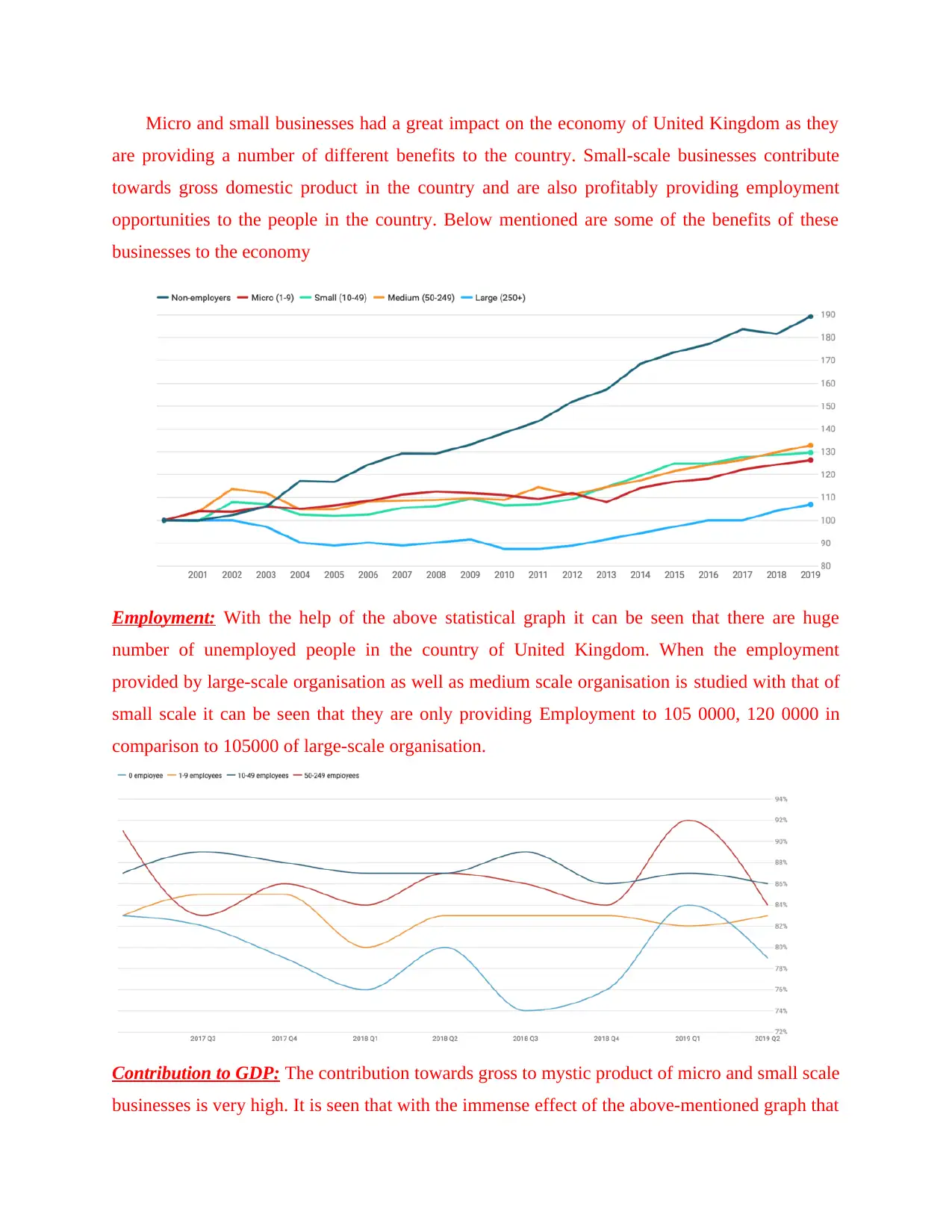
Micro and small businesses had a great impact on the economy of United Kingdom as they
are providing a number of different benefits to the country. Small-scale businesses contribute
towards gross domestic product in the country and are also profitably providing employment
opportunities to the people in the country. Below mentioned are some of the benefits of these
businesses to the economy
Employment: With the help of the above statistical graph it can be seen that there are huge
number of unemployed people in the country of United Kingdom. When the employment
provided by large-scale organisation as well as medium scale organisation is studied with that of
small scale it can be seen that they are only providing Employment to 105 0000, 120 0000 in
comparison to 105000 of large-scale organisation.
Contribution to GDP: The contribution towards gross to mystic product of micro and small scale
businesses is very high. It is seen that with the immense effect of the above-mentioned graph that
are providing a number of different benefits to the country. Small-scale businesses contribute
towards gross domestic product in the country and are also profitably providing employment
opportunities to the people in the country. Below mentioned are some of the benefits of these
businesses to the economy
Employment: With the help of the above statistical graph it can be seen that there are huge
number of unemployed people in the country of United Kingdom. When the employment
provided by large-scale organisation as well as medium scale organisation is studied with that of
small scale it can be seen that they are only providing Employment to 105 0000, 120 0000 in
comparison to 105000 of large-scale organisation.
Contribution to GDP: The contribution towards gross to mystic product of micro and small scale
businesses is very high. It is seen that with the immense effect of the above-mentioned graph that
⊘ This is a preview!⊘
Do you want full access?
Subscribe today to unlock all pages.

Trusted by 1+ million students worldwide
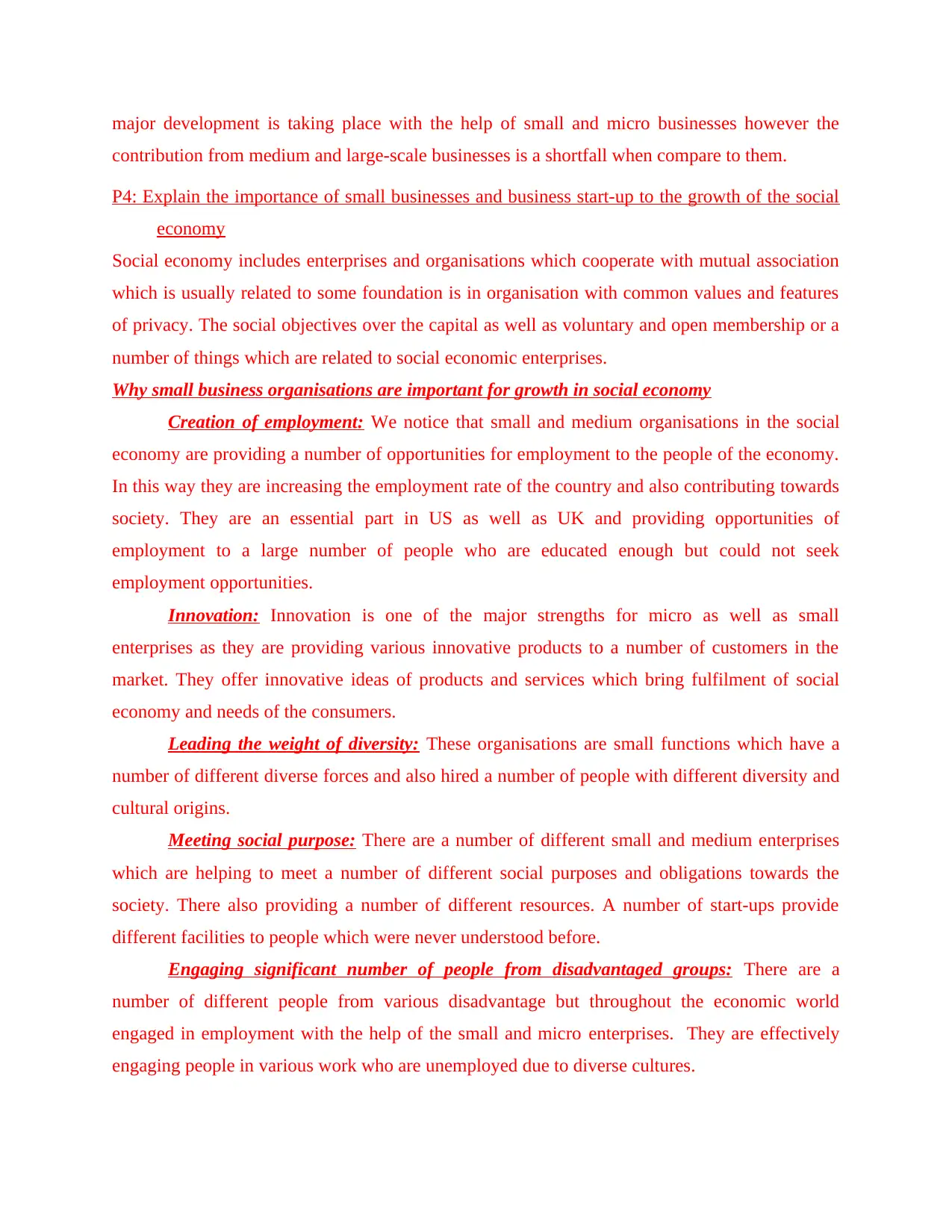
major development is taking place with the help of small and micro businesses however the
contribution from medium and large-scale businesses is a shortfall when compare to them.
P4: Explain the importance of small businesses and business start-up to the growth of the social
economy
Social economy includes enterprises and organisations which cooperate with mutual association
which is usually related to some foundation is in organisation with common values and features
of privacy. The social objectives over the capital as well as voluntary and open membership or a
number of things which are related to social economic enterprises.
Why small business organisations are important for growth in social economy
Creation of employment: We notice that small and medium organisations in the social
economy are providing a number of opportunities for employment to the people of the economy.
In this way they are increasing the employment rate of the country and also contributing towards
society. They are an essential part in US as well as UK and providing opportunities of
employment to a large number of people who are educated enough but could not seek
employment opportunities.
Innovation: Innovation is one of the major strengths for micro as well as small
enterprises as they are providing various innovative products to a number of customers in the
market. They offer innovative ideas of products and services which bring fulfilment of social
economy and needs of the consumers.
Leading the weight of diversity: These organisations are small functions which have a
number of different diverse forces and also hired a number of people with different diversity and
cultural origins.
Meeting social purpose: There are a number of different small and medium enterprises
which are helping to meet a number of different social purposes and obligations towards the
society. There also providing a number of different resources. A number of start-ups provide
different facilities to people which were never understood before.
Engaging significant number of people from disadvantaged groups: There are a
number of different people from various disadvantage but throughout the economic world
engaged in employment with the help of the small and micro enterprises. They are effectively
engaging people in various work who are unemployed due to diverse cultures.
contribution from medium and large-scale businesses is a shortfall when compare to them.
P4: Explain the importance of small businesses and business start-up to the growth of the social
economy
Social economy includes enterprises and organisations which cooperate with mutual association
which is usually related to some foundation is in organisation with common values and features
of privacy. The social objectives over the capital as well as voluntary and open membership or a
number of things which are related to social economic enterprises.
Why small business organisations are important for growth in social economy
Creation of employment: We notice that small and medium organisations in the social
economy are providing a number of opportunities for employment to the people of the economy.
In this way they are increasing the employment rate of the country and also contributing towards
society. They are an essential part in US as well as UK and providing opportunities of
employment to a large number of people who are educated enough but could not seek
employment opportunities.
Innovation: Innovation is one of the major strengths for micro as well as small
enterprises as they are providing various innovative products to a number of customers in the
market. They offer innovative ideas of products and services which bring fulfilment of social
economy and needs of the consumers.
Leading the weight of diversity: These organisations are small functions which have a
number of different diverse forces and also hired a number of people with different diversity and
cultural origins.
Meeting social purpose: There are a number of different small and medium enterprises
which are helping to meet a number of different social purposes and obligations towards the
society. There also providing a number of different resources. A number of start-ups provide
different facilities to people which were never understood before.
Engaging significant number of people from disadvantaged groups: There are a
number of different people from various disadvantage but throughout the economic world
engaged in employment with the help of the small and micro enterprises. They are effectively
engaging people in various work who are unemployed due to diverse cultures.
Paraphrase This Document
Need a fresh take? Get an instant paraphrase of this document with our AI Paraphraser
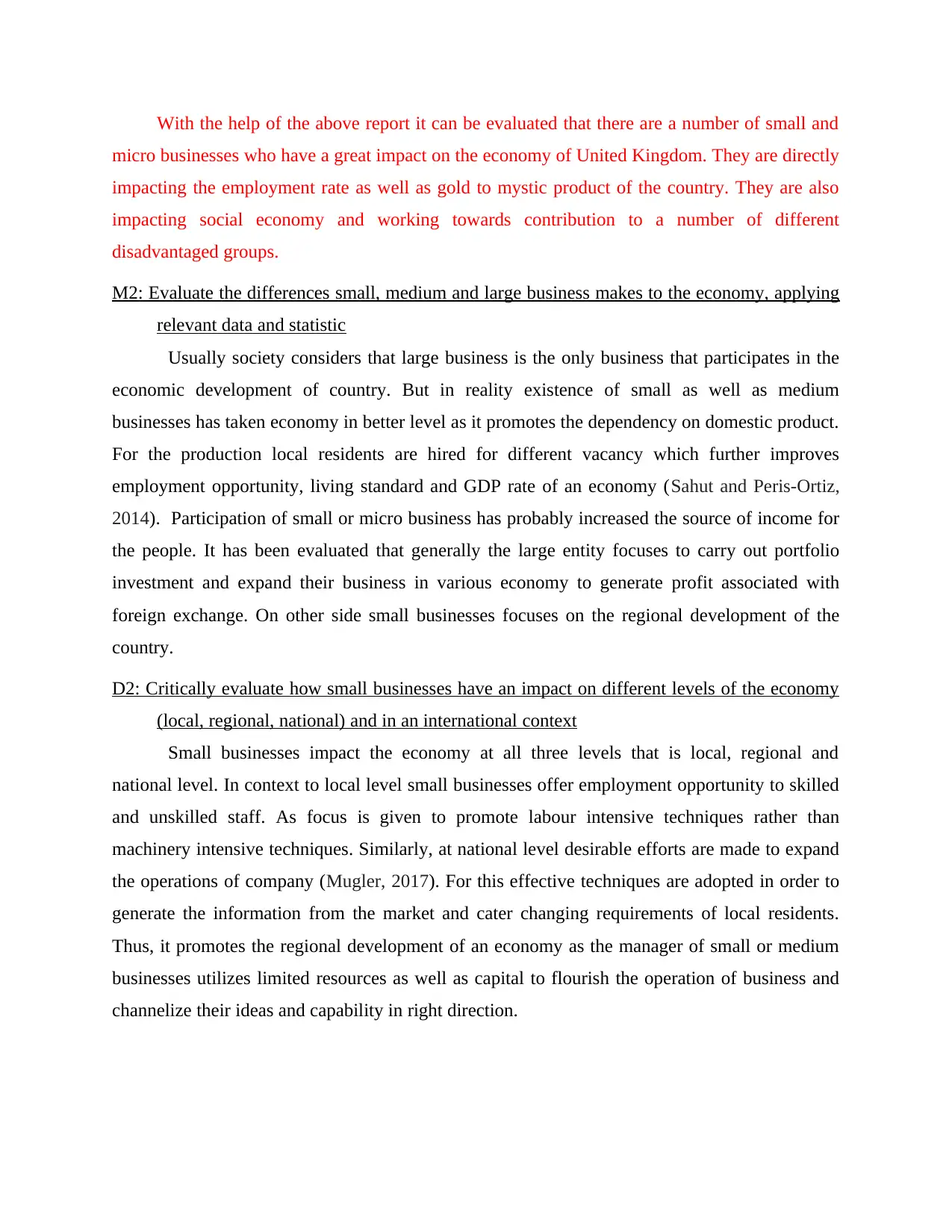
With the help of the above report it can be evaluated that there are a number of small and
micro businesses who have a great impact on the economy of United Kingdom. They are directly
impacting the employment rate as well as gold to mystic product of the country. They are also
impacting social economy and working towards contribution to a number of different
disadvantaged groups.
M2: Evaluate the differences small, medium and large business makes to the economy, applying
relevant data and statistic
Usually society considers that large business is the only business that participates in the
economic development of country. But in reality existence of small as well as medium
businesses has taken economy in better level as it promotes the dependency on domestic product.
For the production local residents are hired for different vacancy which further improves
employment opportunity, living standard and GDP rate of an economy (Sahut and Peris-Ortiz,
2014). Participation of small or micro business has probably increased the source of income for
the people. It has been evaluated that generally the large entity focuses to carry out portfolio
investment and expand their business in various economy to generate profit associated with
foreign exchange. On other side small businesses focuses on the regional development of the
country.
D2: Critically evaluate how small businesses have an impact on different levels of the economy
(local, regional, national) and in an international context
Small businesses impact the economy at all three levels that is local, regional and
national level. In context to local level small businesses offer employment opportunity to skilled
and unskilled staff. As focus is given to promote labour intensive techniques rather than
machinery intensive techniques. Similarly, at national level desirable efforts are made to expand
the operations of company (Mugler, 2017). For this effective techniques are adopted in order to
generate the information from the market and cater changing requirements of local residents.
Thus, it promotes the regional development of an economy as the manager of small or medium
businesses utilizes limited resources as well as capital to flourish the operation of business and
channelize their ideas and capability in right direction.
micro businesses who have a great impact on the economy of United Kingdom. They are directly
impacting the employment rate as well as gold to mystic product of the country. They are also
impacting social economy and working towards contribution to a number of different
disadvantaged groups.
M2: Evaluate the differences small, medium and large business makes to the economy, applying
relevant data and statistic
Usually society considers that large business is the only business that participates in the
economic development of country. But in reality existence of small as well as medium
businesses has taken economy in better level as it promotes the dependency on domestic product.
For the production local residents are hired for different vacancy which further improves
employment opportunity, living standard and GDP rate of an economy (Sahut and Peris-Ortiz,
2014). Participation of small or micro business has probably increased the source of income for
the people. It has been evaluated that generally the large entity focuses to carry out portfolio
investment and expand their business in various economy to generate profit associated with
foreign exchange. On other side small businesses focuses on the regional development of the
country.
D2: Critically evaluate how small businesses have an impact on different levels of the economy
(local, regional, national) and in an international context
Small businesses impact the economy at all three levels that is local, regional and
national level. In context to local level small businesses offer employment opportunity to skilled
and unskilled staff. As focus is given to promote labour intensive techniques rather than
machinery intensive techniques. Similarly, at national level desirable efforts are made to expand
the operations of company (Mugler, 2017). For this effective techniques are adopted in order to
generate the information from the market and cater changing requirements of local residents.
Thus, it promotes the regional development of an economy as the manager of small or medium
businesses utilizes limited resources as well as capital to flourish the operation of business and
channelize their ideas and capability in right direction.
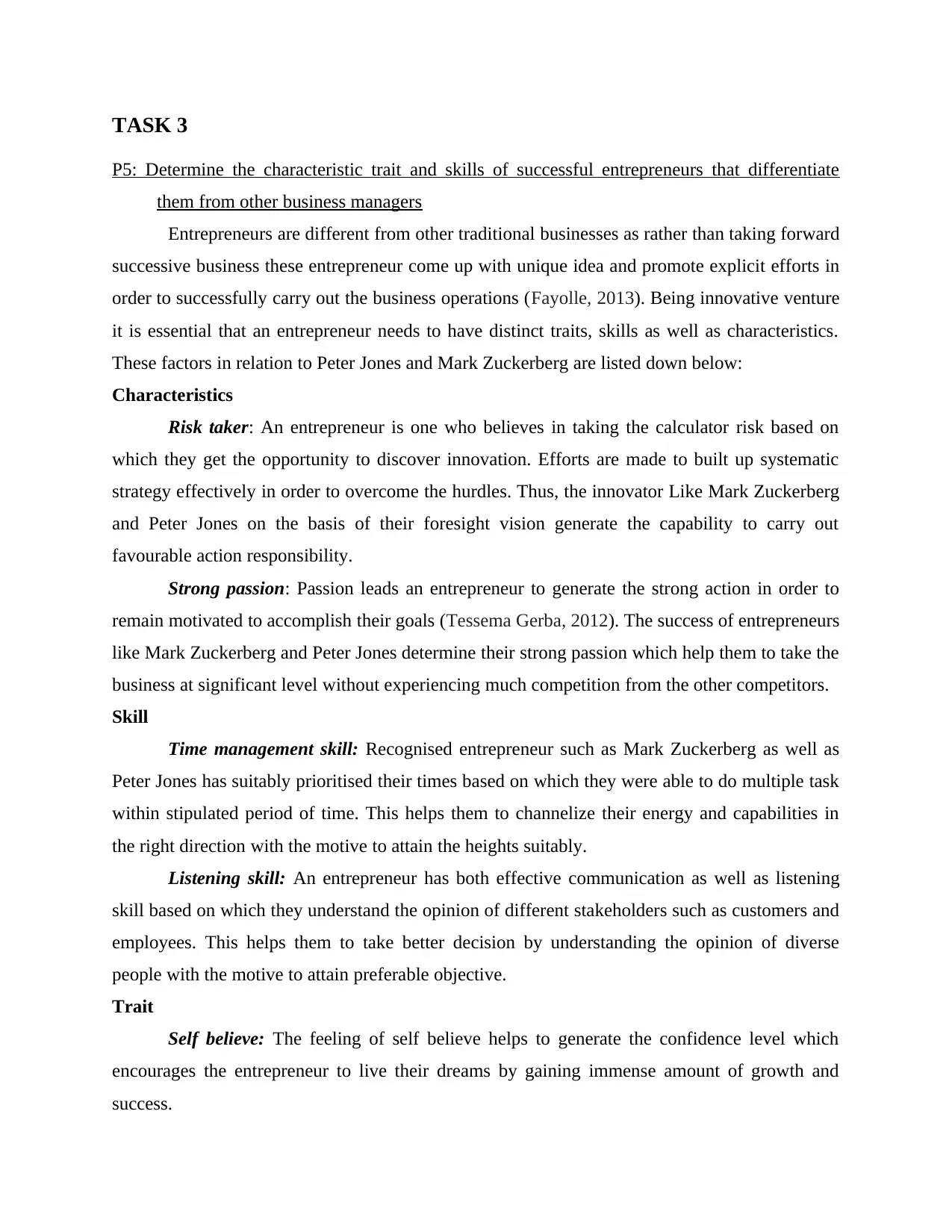
TASK 3
P5: Determine the characteristic trait and skills of successful entrepreneurs that differentiate
them from other business managers
Entrepreneurs are different from other traditional businesses as rather than taking forward
successive business these entrepreneur come up with unique idea and promote explicit efforts in
order to successfully carry out the business operations (Fayolle, 2013). Being innovative venture
it is essential that an entrepreneur needs to have distinct traits, skills as well as characteristics.
These factors in relation to Peter Jones and Mark Zuckerberg are listed down below:
Characteristics
Risk taker: An entrepreneur is one who believes in taking the calculator risk based on
which they get the opportunity to discover innovation. Efforts are made to built up systematic
strategy effectively in order to overcome the hurdles. Thus, the innovator Like Mark Zuckerberg
and Peter Jones on the basis of their foresight vision generate the capability to carry out
favourable action responsibility.
Strong passion: Passion leads an entrepreneur to generate the strong action in order to
remain motivated to accomplish their goals (Tessema Gerba, 2012). The success of entrepreneurs
like Mark Zuckerberg and Peter Jones determine their strong passion which help them to take the
business at significant level without experiencing much competition from the other competitors.
Skill
Time management skill: Recognised entrepreneur such as Mark Zuckerberg as well as
Peter Jones has suitably prioritised their times based on which they were able to do multiple task
within stipulated period of time. This helps them to channelize their energy and capabilities in
the right direction with the motive to attain the heights suitably.
Listening skill: An entrepreneur has both effective communication as well as listening
skill based on which they understand the opinion of different stakeholders such as customers and
employees. This helps them to take better decision by understanding the opinion of diverse
people with the motive to attain preferable objective.
Trait
Self believe: The feeling of self believe helps to generate the confidence level which
encourages the entrepreneur to live their dreams by gaining immense amount of growth and
success.
P5: Determine the characteristic trait and skills of successful entrepreneurs that differentiate
them from other business managers
Entrepreneurs are different from other traditional businesses as rather than taking forward
successive business these entrepreneur come up with unique idea and promote explicit efforts in
order to successfully carry out the business operations (Fayolle, 2013). Being innovative venture
it is essential that an entrepreneur needs to have distinct traits, skills as well as characteristics.
These factors in relation to Peter Jones and Mark Zuckerberg are listed down below:
Characteristics
Risk taker: An entrepreneur is one who believes in taking the calculator risk based on
which they get the opportunity to discover innovation. Efforts are made to built up systematic
strategy effectively in order to overcome the hurdles. Thus, the innovator Like Mark Zuckerberg
and Peter Jones on the basis of their foresight vision generate the capability to carry out
favourable action responsibility.
Strong passion: Passion leads an entrepreneur to generate the strong action in order to
remain motivated to accomplish their goals (Tessema Gerba, 2012). The success of entrepreneurs
like Mark Zuckerberg and Peter Jones determine their strong passion which help them to take the
business at significant level without experiencing much competition from the other competitors.
Skill
Time management skill: Recognised entrepreneur such as Mark Zuckerberg as well as
Peter Jones has suitably prioritised their times based on which they were able to do multiple task
within stipulated period of time. This helps them to channelize their energy and capabilities in
the right direction with the motive to attain the heights suitably.
Listening skill: An entrepreneur has both effective communication as well as listening
skill based on which they understand the opinion of different stakeholders such as customers and
employees. This helps them to take better decision by understanding the opinion of diverse
people with the motive to attain preferable objective.
Trait
Self believe: The feeling of self believe helps to generate the confidence level which
encourages the entrepreneur to live their dreams by gaining immense amount of growth and
success.
⊘ This is a preview!⊘
Do you want full access?
Subscribe today to unlock all pages.

Trusted by 1+ million students worldwide
1 out of 20
Related Documents
Your All-in-One AI-Powered Toolkit for Academic Success.
+13062052269
info@desklib.com
Available 24*7 on WhatsApp / Email
![[object Object]](/_next/static/media/star-bottom.7253800d.svg)
Unlock your academic potential
Copyright © 2020–2026 A2Z Services. All Rights Reserved. Developed and managed by ZUCOL.





